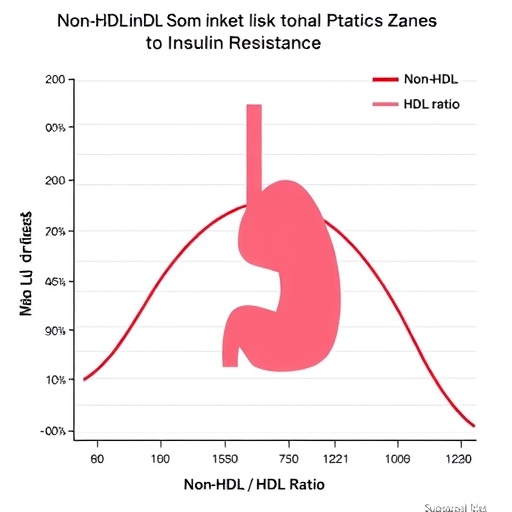
Research conducted by Wang et al. in 2025 has shed light on a pressing health issue: the interplay between Body Mass Index (BMI) changes over time and glycemic control in Finnish patients afflicted with Type 2 Diabetes. With rising obesity rates globally, understanding how BMI affects diabetes management is more crucial than ever. This study provides invaluable insights for healthcare professionals, patients, and policymakers alike, emphasizing the need for targeted interventions and a reevaluation of current treatment protocols.
The authors utilized a comprehensive dataset comprised of a substantial cohort of Finnish individuals diagnosed with Type 2 Diabetes. By analyzing longitudinal BMI data alongside glycemic control metrics, the research aimed to uncover trends that can aid in anticipating challenges in diabetes management. As obesity is closely linked to insulin resistance and poor glycemic control, the researchers were particularly keen on dissecting whether rising BMI levels correlate with worsening diabetes management outcomes.
Through rigorous statistical analysis, the study identified notable trends over recent years. The findings revealed not just an increase in the average BMI among participants but also a concerning trend toward deteriorating glycemic control. This sets off alarms about the broader implications for public health. With the simultaneous rise of Type 2 Diabetes and obesity, the results call for urgent action from healthcare systems to tackle this dual epidemic more effectively.
The research also delved into various factors that could contribute to the observed trends. These included lifestyle changes, dietary habits, and socio-economic factors affecting patients. As the study points out, merely tracking BMI is not sufficient; understanding the underlying social determinants of health can lead to more successful interventions. The researchers underscore the importance of adopting a holistic approach to diabetes care that goes beyond medication to include lifestyle modifications and counseling.
Additionally, the role of healthcare providers was discussed extensively in the paper. They are in a unique position to monitor patients not just for baseline metabolic indicators like fasting glucose and HbA1c but also for BMI and potential weight gain trends. This multidimensional approach can better inform the management strategies employed, thereby improving patient outcomes significantly.
The study also highlights the pressing need for increased awareness and education regarding the relationship between weight and diabetes management among patients. Many individuals living with Type 2 Diabetes may not fully understand how excess weight impacts their condition or may underestimate its importance in their daily management efforts. Improving patient knowledge could potentially empower them to make informed lifestyle choices that positively influence their health trajectory.
Furthermore, the findings prompt a necessary conversation about the accessibility of obesity management resources for diabetes patients. Finland’s health system, like many others worldwide, faces gaps in delivering integrated care. Addressing these disparities is vital, as effective obesity interventions can facilitate improved glycemic control and overall health outcomes for diabetic patients.
In a world where the double burden of obesity and diabetes is prevalent, collaboration among various sectors is essential. Governments, healthcare institutions, industry stakeholders, and community organizations must work collectively to develop viable solutions. This multifaceted approach presents opportunities for behavioral interventions, enhanced screening programs, and public health campaigns focused on preventive care.
As the study continues to resonate in the medical community, one can’t help but consider the broader implications. Unchecked obesity and poor glycemic control not only affect individual patient health but can also lead to increased healthcare costs and a burdened healthcare system. Addressing these interconnected issues is crucial for the sustainability of healthcare services and the wellbeing of society as a whole.
The research by Wang et al. exemplifies the critical role that emerging studies can play in shaping public health policy. By providing evidence-based insights, the study advocates for rethinking current diabetes management frameworks and investing in comprehensive educational initiatives that highlight the intricate relationship between weight and glycemic control.
In conclusion, the alarming trajectories observed in Body Mass Index and glycemic control amongst Finnish Type 2 Diabetes patients serve as a clarion call for immediate action. The community of healthcare providers, patients, and policymakers must unite to reverse these trends through effective interventions, education, and increased awareness. If left unaddressed, these trends may culminate in even more severe public health ramifications, further complicating the challenges posed by diabetes management globally.
The importance of such research cannot be overstated. It is vital for ongoing discussions surrounding diabetes treatment and management strategies, providing a pathway toward a healthier future for those affected by this chronic condition. The proactive measures derived from these findings will undoubtedly play a critical role in the evolution of diabetes care, ultimately contributing to improved quality of life for patients struggling to maintain their health.
Subject of Research: The impact of Body Mass Index (BMI) on glycemic control among Finnish patients with Type 2 Diabetes.
Article Title: Time Trends of Body Mass Index and its Impact on Glycemic Control Among Finnish Patients with Type 2 Diabetes.
Article References: Wang, Z., Lavikainen, P., Wikström, K. et al. Time Trends of Body Mass Index and its Impact on Glycemic Control Among Finnish Patients with Type 2 Diabetes. Diabetes Ther 16, 1665–1679 (2025). https://doi.org/10.1007/s13300-025-01763-2
Image Credits: AI Generated
DOI: https://doi.org/10.1007/s13300-025-01763-2
Keywords: Body Mass Index, Glycemic Control, Type 2 Diabetes, Obesity, Public Health, Diabetes Management.
Tags: BMI trends and glycemic controldiabetes management challengesFinnish Type 2 Diabetes patientshealthcare interventions for diabeticsinsulin resistance and glycemic controllongitudinal BMI data analysisobesity and diabetes managementpublic health implications of obesityrising obesity rates impactstatistical analysis in diabetes researchtreatment protocols for Type 2 DiabetesWang et al. 2025 diabetes study




